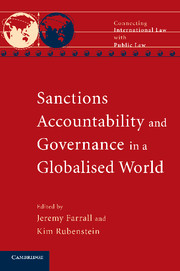Book contents
- Frontmatter
- Contents
- Contributors
- Series editors' preface
- Editors' preface
- Introduction: Filling or falling between the cracks? Law's potential
- PART I Setting down the foundations
- PART II Internationalising public law
- PART III Implementing Security Council sanctions
- PART IV The place of corporations
- PART V The role of lawyers
- PART VI Public law and public policy
- 13 Who's responsible? Justiciability of private and political decisions
- 14 AWB and oil for food: Some issues of accountability
- PART VII Parallel case studies
- Concluding remarks
- Bibliography
- Index
14 - AWB and oil for food: Some issues of accountability
Published online by Cambridge University Press: 05 October 2010
- Frontmatter
- Contents
- Contributors
- Series editors' preface
- Editors' preface
- Introduction: Filling or falling between the cracks? Law's potential
- PART I Setting down the foundations
- PART II Internationalising public law
- PART III Implementing Security Council sanctions
- PART IV The place of corporations
- PART V The role of lawyers
- PART VI Public law and public policy
- 13 Who's responsible? Justiciability of private and political decisions
- 14 AWB and oil for food: Some issues of accountability
- PART VII Parallel case studies
- Concluding remarks
- Bibliography
- Index
Summary
Introduction
The scandal surrounding the Australian Wheat Board's (AWB's) breaches of the UN Oil-for-Food Programme (OFFP) was played out globally across international and domestic fora. This chapter examines the affair from an accountability perspective, using it as a case study of the similarities and differences between domestic and international accountability regimes. While the understanding of accountability differs significantly between the domestic and international spheres, largely because of the comparative weakness of international political and legal institutions, underlying continuities in both the theory and the practice of accountability provide a basis for fruitful comparison. The AWB affair also illustrates the complex and multifarious nature of accountability structures, whereby being able to hold a particular agent to account for a particular action is often the product of a series of accountability processes by a variety of different individuals and institutions with different powers and incentives.
Finally, the AWB affair underscores the ambivalent nature of all such accountability crises. On the one hand, it demonstrates a failure of accountability. The domestic Australian Cole Inquiry and its international predecessor, the Volcker Inquiry, undoubtedly revealed serious accountability deficiencies in the administration and monitoring of the Iraq sanctions regime in general and the OFFP in particular. On the other hand, these inquiries themselves and the political pressures that gave rise to them provide an accountability success story. They helped to bring the facts to light and so provided impetus for establishing a more effective accountability structure.
- Type
- Chapter
- Information
- Sanctions, Accountability and Governance in a Globalised World , pp. 334 - 352Publisher: Cambridge University PressPrint publication year: 2009
- 1
- Cited by

